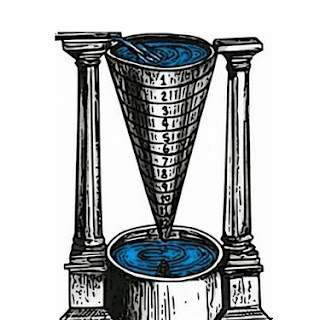What was the Ancient Greek water clock Clepsydra?
The water clock was developed to solve the problem of the first timekeeping device known as the sundial. The problem with the sundial was it was only functional when the sun was out. This was an obvious issue and sparked inventors to find a new way to solve the timekeeping problem. Around 325 BC work began on Clepsydra, the Ancient Greek water clock.
Shortly after water clocks were placed in public places in Ancient Greece. Most often you could see them in court, to limit the speech time of both lawyers and witnesses. When the water supply has completely run out of device speakers have completely run out of time.
How did the Ancient Greek water clock work? (Animation)
shaped board. On the board are 24 squares, which stand for hours.
When the canister is full (24 hours have passed), the water flows through the pipe. The outflown water powers a gear, which rotates the board. The further the board rotates, the more days pass.
This simple piece of mechanics, adjusted rightly, could be quite precise.
How was Clepsydra designed?
The water clock was a bowl-like canister and made of stone. The device had a hole in the bottom to control the flow of pressurized water non-stop. These holes pointed to other similar canisters that the water overflow ran into. The Clepsydra was also able to keep up with the hour of day vai markings on its side. As the water level changes the markings reveal the hour of the day.The second canister was not added until later on around the third century BC. This is when a man named Ktesibios or Ctesibius came and changed Clepsydra. He did this by adding another canister to catch the water that flows out of the top hole.
Not long after an inventor Vitruvius came along. His ambition was to not only enhance the design but the technology behind the Clock as well.
He added the markings, which shows the hour of day based on the water level.
In the ancient world, what effect did Clepsydra have?
Clepsydra's impact on the ancient world was huge. Without it, they would not have a reliable way of keeping time. Although they already had the sundial. The Clepsydra was far more reliable and useful as a result. This was very important for their legal system first and foremost. The water clock also was extremely useful for everyday uses. For example, knowing what time markets were open. Using the sundial they could have been hours late.The water clock started the idea of a timer and a legit device that kept time. This leads the ancient world to create more and more timepieces.
The technology behind the Clepsydra is at the core of modern timekeeping products today.
Clepsydra didn't only affect the ancient greeks. It also had a huge effect on many other civilizations as well. Many other civilizations would soon adopt the technology. Not only did they use it in their everyday lives. They also made great efforts to advance the water clock technology.
Clepsydra served as the core for the progress of timepieces. The ancient greek water clock would eventually lead to the development of the mechanical clock. The technology of the mechanical clock leads to the rise of clock towers. Quartz would also soon be developed on the back of the technology behind the mechanical clock. Even if you have a digital clock or tell time with your mobile phone it's rooted all the way back to the water clock.
How has the Ancient Greek water clock affected us in modern times?
The obvious and greatest impact of the water clock is without it we would not be able to keep time without it. Without being able to keep time our modern society would not be able to function. How would we know when to arrive at work, or when to get the kids off for school. The proper time to have breakfast, lunch, dinner? That's only scratching the service of course. I am sure you can thinking of many more ways modern life would be impossible without clocks.
The water clock undoubtedly had one of the biggest technological impacts in history. Society as a whole would be completely nonfunctionally without some way of accurately telling time. There would be no way for us to keep an accurate schedule. Everything would be a mess with events happening and people arriving at random times.
In the scientific world, the water clock had arguably an even greater impact. Timekeeping had a major role in scientific discoveries. Many experiments would not be possible without an accurate of keeping time. For instance, Galileo used the water clock for many of his experiments. In the end, the water clock was able to allow scientists to make scientific progress.
Advertisement





